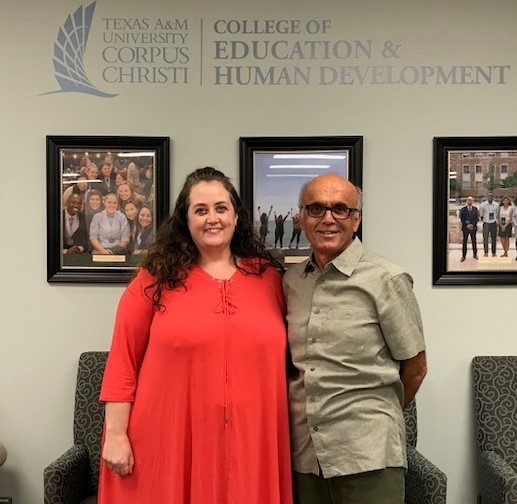What does it feel like to finally have a doctorate degree?
It feels like having a weight being lifted off of you. At least that’s what Dr. Patricia Chastain says.
Chastain, the student employment coordinator for Career Services, had her doctorial defense on Sept. 20 at Texas A&M University-Corpus Christi.

Photo contributed by Patrica Chastain
Her dissertation is titled “Examining the Relationship Between Co-Circular Activities and the Development of Critical Thinking Skills in a Non-Probability Sample of Freshmen and Senior University Students.”
“Basically it was a study conducted using Texas Wesleyan national survey of student education results to determine if there is a correlation between involvements in a Co-Curricular activities including the campus environment, diversity, and higher impact practices such as employment and internships with developing critical thinking skills such as quantities reasoning, higher older learning and reflective learning,” Chastain wrote in an email.
Chastain had full confidence of getting her doctoral degree in educational leadership while she was balancing work at Texas Wesleyan University and getting her degree at Texas A&M between 2013 and 2018.
“I knew I was going to finally get my doctorate, but it’s been a real struggle,” Chastain said. “Now I feel like I can reach higher than I reached before with certain jobs or certain employment.”
One of the most important things for Chastain is when people will start to call her “doctor.”
“What I always wanted is to have Dr. Chastain on my airline ticket now,” Chastain said.
Chastain thinks that it is significant to have someone, whether it’s a professor or a friend, that motivates you not to be a procrastinator.
“I think that it is important because you kind of need to know that somebody has your back,” Chastain said. “In any of the processes you take, you need to know that somebody is there to push you out of your comfort zone.”
And that is exactly what Dr. Kamiar Kouzekanani, professor of quantitative methods in the College Education and Human Development at Texas A&M, did for Chastain.
“Chastain was hardworking, dedicated and disciplined,” Kouzekanani wrote in an e-mail. “Also being away from Corpus Christi while completing her study made the task quite challenging. I couldn’t be more proud of Patricia.”
Chastain calls Kouzikanani Superman, because he saved her from dropping out of the program due to the absence of her previous dissertation chair.
“Three years prior to having Kouzekanani as my dissertation chair, I did not have anybody who felt supportive of me,” Chastain said. “He kept pushing and pushing me and telling me that I will get this dissertation done by this time.”
But Kouzekannai wasn’t the only support Chastain got.
Dr. Nancy Smith, a visiting assistant professor for the Department of Educational Leadership, Curriculum and Instruction at Texas A&M, became a friend and an encourager that talked with Chastain through the process of finishing the program.
“The light never comes on through until you are deep in the forest of dissertation and feeling alone and lost,” Smith said. “I just kept telling her to hang in there, and believe in herself, and that she could do it.”
Other people in Chastain’s life who helped give her encouragement were her coworkers at Wesleyan like Michael Gatton, assistant director of Career Services.
“I am so proud of her that she has completed her goal and earned her doctorate,” he said. “I know it was crucial achievement and that the process has been a major part of her life for the last few years.”
The most significant thing that Chastain has learned about herself during the process of getting her doctorate is that she feels that she is a lot stronger than she thought she was.
“I think you realize when you make it through this process that you really are stronger and more capable than you realize,” Chastain said.









![Pippin, played by Hunter Heart, leads a musical number in the second act of the musical. [Photo courtesy Kris Ikejiri]](https://therambler.org/wp-content/uploads/2025/04/Pippin-Review-1200x800.jpg)
![Harriet and Warren, played by Trinity Chenault and Trent Cole, embrace in a hug [Photo courtesy Lauren Hunt]](https://therambler.org/wp-content/uploads/2025/02/lettersfromthelibrary_01-1200x800.jpg)
![Samantha Barragan celebrates following victory in a bout. [Photo courtesy Tu Pha]](https://therambler.org/wp-content/uploads/2025/05/20250504_164435000_iOS-834x1200.jpg)





![Hunter Heart (center), the play's lead, rehearses a scene alongside other student actors. [Photo courtesy Jacob Sanchez]](https://therambler.org/wp-content/uploads/2025/04/thumbnail_IMG_8412-1200x816.jpg)
![Student actors rehearse for Pippin, Theatre Wesleyan's upcoming musical. [Photo courtesy Jacob Rivera-Sanchez]](https://therambler.org/wp-content/uploads/2025/04/Pippin-Preview-1200x739.jpg)
![[Photo courtesy Brooklyn Rowe]](https://therambler.org/wp-content/uploads/2025/05/CMYK_Shaiza_4227-1080x1200.jpg)

![Lady Rams softball wraps up weekend against Nelson Lions with a victory [6 – 1]](https://therambler.org/wp-content/uploads/2025/04/Screenshot-2025-04-04-100924-1200x647.png)















